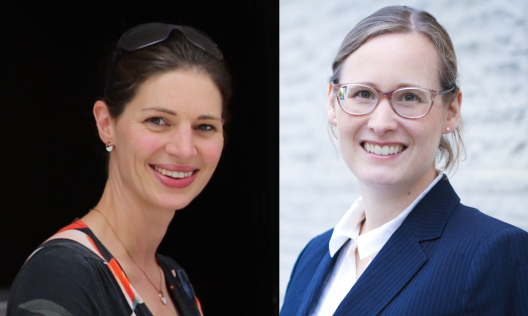“We Are at the Beginning of a Change in Mentality”
Women are underrepresented in science worldwide. This is especially true for the forward-looking STEM subjects - mathematics, computer science, natural sciences and technology. This is highlighted by the “International Day of Women and Girls in Science” on February 11th, which was initiated by UNESCO in 2015. Dr Julia Quante and Alexandra Kohlhöfer, Managing Directors of the International Graduate School BACCARA (Battery Chemistry, Characterization, Analysis, Recycling and Application) at the University of Münster, report on opportunities and challenges for female scientists and answer the question of helpful hints in scientific career planning.

What opportunities are there for female scientists in a career in science, especially in chemistry?
Alexandra Kohlhöfer: Chemistry offers a broad range of tasks with numerous different fields of work. There are many doctoral positions that are financed by third-party funds, and afterwards there are often opportunities to work in attractive research projects. Münster in particular, as a science location and battery research hotspot, is an attractive environment for a scientific career – regardless of gender.
What are you currently observing in the area of women in research?
Julia Quante: There are still too few highly qualified women in research. That is an observation that cuts across all disciplines. The further up the career ladder you look, the lower the proportion of women in science still is. And I am not talking about having one or two women on a management board, but about a gender balance.
Alexandra Kohlhöfer: At the same time, I am experiencing a change in awareness. More and more attention is being paid to ensuring that positions are filled in a gender-balanced way, for example. However, we are at the beginning of this change in mentality, because fundamental structures have to change in order to be able to achieve this goal at all. Childcare, flexible working hours, breastfeeding and diaper-changing facilities at the workplace, the scheduling of meetings not in the late afternoon or evening, or part-time management are all possible levers in this regard. And it is essential that women are also represented in higher positions, on the one hand as role models, and on the other hand because they may have a different understanding of structurally necessary adjustments from their own experience and are then also in a position to help shape these directly.
Your international Graduate School BACCARA has a share of women of around 40 percent. This is quite unusual in the field of chemistry and above average. What are you doing to specifically address women as well?
Julia Quante: We have had our website and job advertisements evaluated externally and have sought advice on visual language, approach and diversity in general. We also take great care to represent all groups equally. For example, we have explicitly featured our female professors in a series of interviews and plan to do the same with our female doctoral students. In our lecture series “Electrochemistry and Energy Storage” we make sure that women and men are equally represented among the speakers.
Alexandra Kohlhöfer: These efforts have already shown success: In the second wave of applications, the proportion of applications from women increased by approximately 35 percent compared to the first call. It is important to note that giving women a chance does not mean sacrificing qualifications – as some people assume – that is absolute nonsense! Nobody gets a job just because of a specific gender – no matter if man, woman or diverse. Much more, we see that qualifications are high across gender.
How does BACCARA specifically support women in science?
Alexandra Kohlhöfer: We point out appropriate event formats, currently support two of our female doctoral students with childcare, and are working on our own event formats for women. In this context, we are planning to cooperate with the gender pooling of the University of Münster, which, for example, offers career training and advanced training for female scientists.
Julia Quante: We also encourage our doctoral students to talk to each other and to address issues openly. Everyone is responsible for changing the mentality. On the one hand, to address things yourself or to demand them, on the other hand, to be sensitive to third parties and to take into account, for example, that network meetings exclusively in the evening could be a challenge for mothers with children.
What do you wish for BACCARA in the future with regard to women and girls in science?
Julia Quante: For BACCARA, I would like us to realize more offers for women and to create a safe, trusting space in which all topics can be addressed in a non-judgmental way.
Alexandra Kohlhöfer: If we can get women to form stronger networks among themselves, support each other and act as role models, that would be a big step forward.

